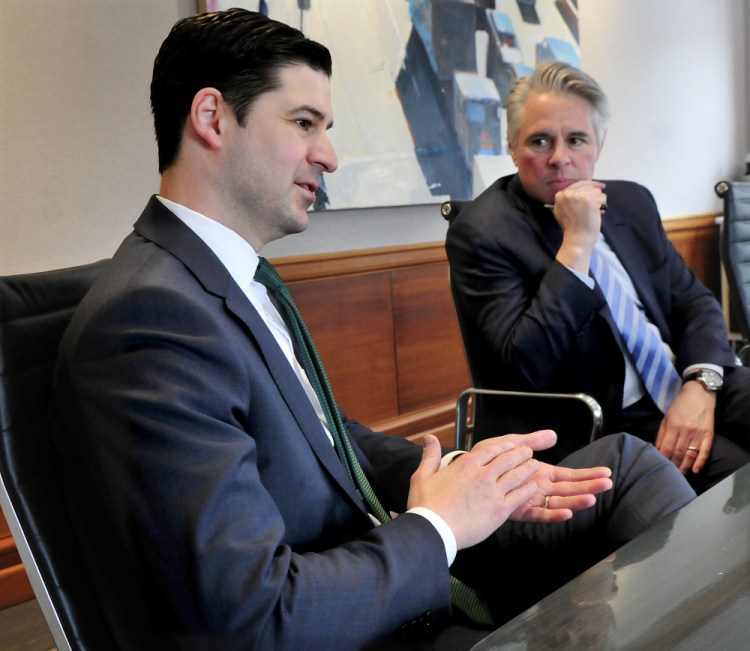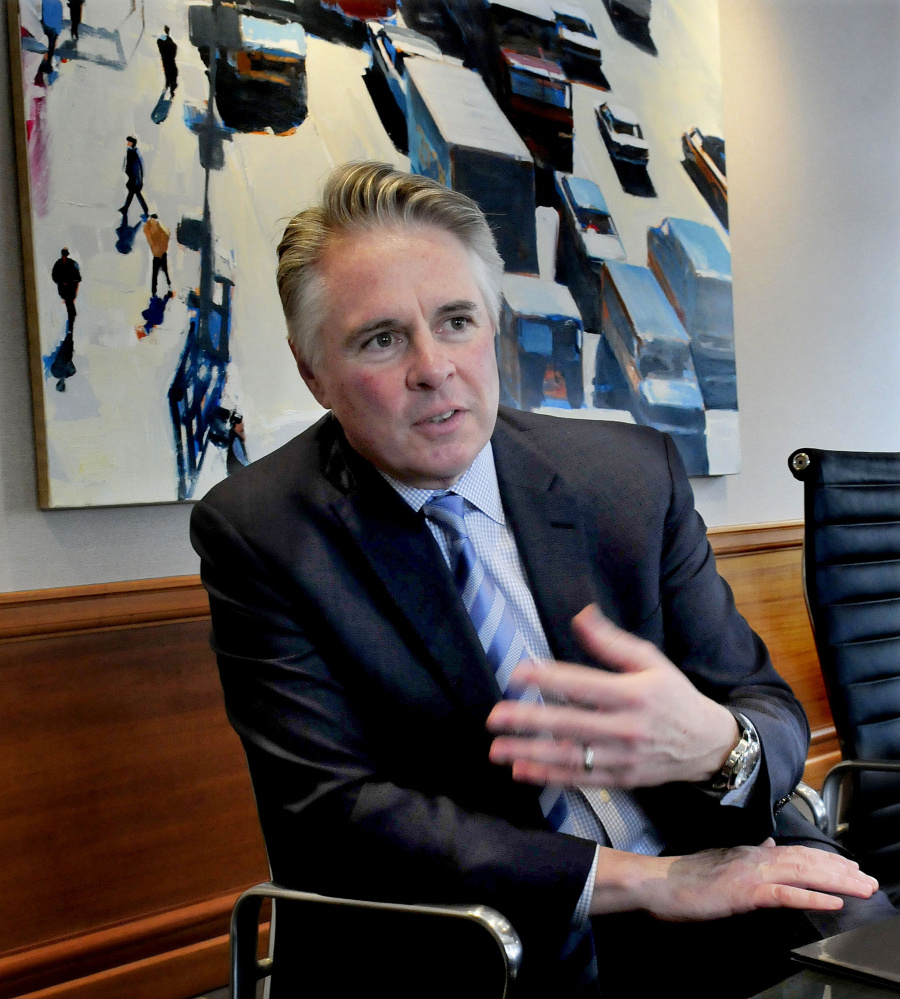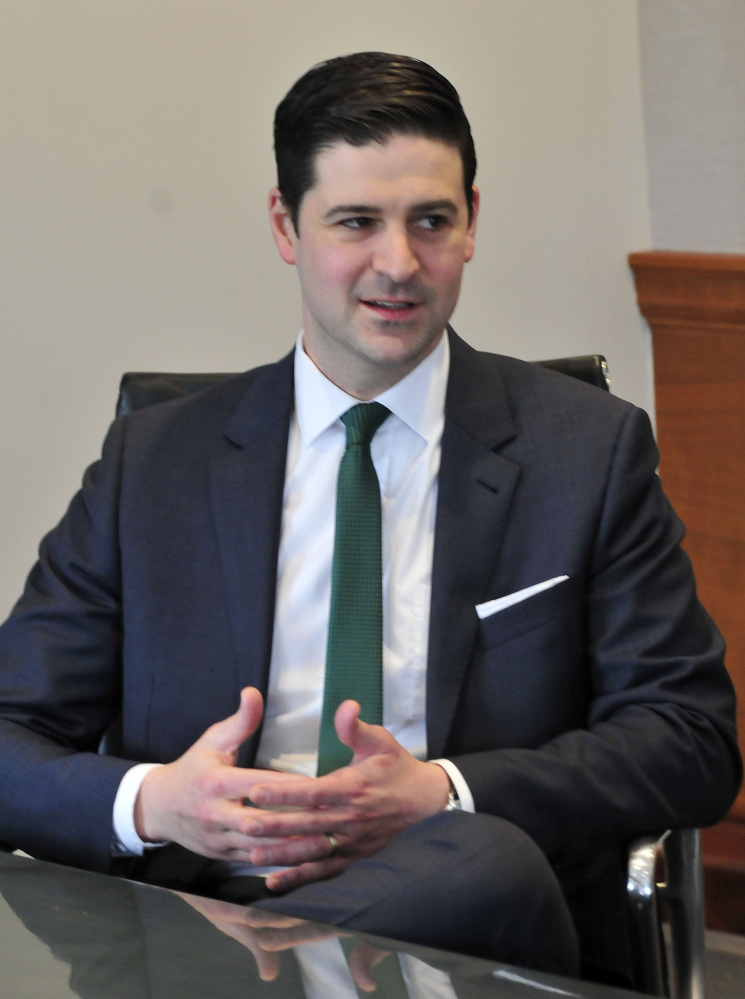WATERVILLE — When Colby College’s hotel and residential complex are built downtown and the former Hains building is renovated and occupied, the taxes Colby will pay to the city from the investments is projected to be $140,500 a year — more than that of the five highest taxpayers downtown combined.
Beyond that, the developments, expected to cost more than $45 million, will bring hundreds of jobs to the city, more people living, working, eating, shopping and attending cultural events and a new and vibrant look to downtown that will be attractive to prospective residents, including young people.
That is the vision Colby President David Greene and Mayor Nick Isgro look to when they take a step back and remember why the college and city got together in the first place some two years ago to start conversations about how to improve the downtown, help businesses already here and try to boost economic development in the long term.
“That’s the picture we never want to lose sight of,” Greene said Wednesday.
But that vision is now at a turning point. Success of the major downtown projects, Greene acknowledges, hinges on Colby’s being able to have needed parking spaces for the planned 42-room boutique hotel and restaurant on the former site of Levine’s clothing store at 9 Main St.
Without that parking availability, Colby’s hotel project will not be possible; and without the hotel, the $25 million residential complex for students at 150 Main St. also will not be built, according to Greene. City councilors last week postponed a vote on leasing 42 of the 60 parking spaces in the city-owned Front Street lot behind the planned hotel after college officials decided they needed more time to look at options. The proposal to lease the Front Street spaces to Colby for 99 years, at a cost of $1 per year, sparked controversy among some business people and employees downtown who said the spaces are used regularly by the employees.
City Manager Michael Roy, City Solicitor Bill Lee and two city councilors are working on the proposal for leasing parking spaces in the Front Street lot to Colby; and the City Council on Tuesday is expected to take a first of two needed votes to approve such a lease. The meeting is scheduled for 7 p.m. in the council chamber at The Center. The council would take a final vote in two weeks.
Isgro, though, said he is confident an agreement will be reached on the parking issue, saying he has spoken with the councilors working on it.
“They’re committed to making sure these projects go forward,” Isgro said. “It is important that they represent the community that they serve and part of that actually means making sure these projects are successful because that is what the people are counting on. The city and Colby are working on the specifics of what space is needed to make sure that this hotel project is a success and I have all the confidence that it will happen.”
MAJOR INVESTMENTS
When Greene, city officials, business people and other downtown advocates met over several months to discuss ways to improve downtown, they focused on not doing things around the edge — not doing one or two things — as that would be a recipe for failure, Greene said.
Thus, Colby made significant investments in several projects downtown, with each depending on the other to be successful.
“It’s important for the city to continue to look at the larger scale of these projects, because the community is counting on us not to fail, but to make sure that we seize this once-in-a-lifetime opportunity to harness major investment,” Isgro said.
Greene and Isgro met Wednesday on the Mayflower Hill campus to discuss downtown revitalization progress, with Isgro calling Colby’s investment incredible in its size, scale of projects and commitment. He called it not just an investment, but a long-term partnership.
Colby and the Harold Alfond Foundation announced late last year that they were committing $20 million to jump-start downtown revitalization efforts.
“What’s at stake is the potential to attract and unlock the talent and the jobs that will affect every single member of this community in a way that will be tangible to everyone — not just those who are downtown,” Isgro said.
Greene also said there is a lot at stake in the projects and Colby has taken an extraordinary amount of risk.
“We can’t fail; this is something where we need to be successful,” he said.
Now the key to the slate of projects is the hotel. Colby has a developer lined up for the hotel, is choosing an architect and is ready to move forward with the project, according to Greene.
“I know that the project will not go without a parking solution. It’s impossible to have a hotel without parking,” he said.
City Assessor Paul Castonguay said Wednesday that he estimates the taxes Colby will pay for the three developments is $140,500 per year.
The city assessor’s website lists the top-paying taxpayers downtown as HK Maine Properties, or Hathaway, at $38,578; Sidney Geller Trust, $28,775; 93 Main St., or The Center, $25,775; Camden National Bank, $24,455; and 10 Concourse West, which includes Goodwill, $19,161.
Greene said one of the questions he hears a lot now is whether Colby is doing its share of contributing to the city — the college does not pay property taxes on its Mayflower Hill campus — and he thinks that is a fair question. There are a lot of different ways to look at the issue, he said.
Colby expects to pay $140,500 in taxes on its properties downtown, which now provide the city with slightly more than $20,000 a year, he said.
“So, over 10 years, that’s going to add roughly $1.2 million in taxes to the city for a small group of buildings,” he said, adding that it is just the beginning and Colby is committed to the project and to doing its share.
MAGIC NUMBER: 1,000 JOBS
In response to a question from city officials about what it would take to decrease the tax rate, an appraisal company official recommended that 1,000 new jobs would do that, as it would stimulate economic activity and bring new families to Waterville, according to Isgro.
The forthcoming Trafton Road interchange at Interstate 95 — a $4.8 million project creating new on- and off-ramps at mile 124 — also will help spur growth within city limits, according to Isgro.
CGI Group, which is housed in the Hathaway Creative Center, plans to move to the upper floor of the Hains building at 173 Main St. in the summer and employ about 200 people downtown in a few years.
Greene said that Colby added 70 new employees to the college in the last two years and the boutique hotel will employ another 45. He said he can imagine it is totally plausible to add 1,000 jobs to the city in the next five to 10 years.
“One thousand is an ambitious but obtainable goal and we’re well on our way to it — and it’s just starting,” he said.
Colby contributes to Central Maine Growth Council, which acts as Waterville’s office of economic development, and Brian Clark, vice president of planning for Colby, is a member of that organization’s board.
Colby spends $5 million a year on products and services from small local businesses, Greene said. Indirect spending is much higher than that, according to Greene. Colby students contribute to the community in many ways, including volunteering at the Mid-Maine Homeless Shelter where last year, they contributed 43,000 hours, he said.
“I know how important that is to places like the homeless shelter,” he said. “They tell me they cannot survive without those volunteer hours. It’s a real significant commitment.”
Of 2,000 students enrolled at Colby, 200 are Maine residents. Colby helps them with $6.5 million in financial aid, making Colby much less expensive than the University of Maine, according to Greene.
“We stay between 10 and 12 percent, which has been a real commitment for us, especially when we have over 11,000 applicants for 500 students in a class,” he said. “It’s something I want to maintain.”
Colby’s total payroll is $55 million a year, and $40 million of that goes to employees who are residents of Waterville and nearby communities, according to Greene.
The residential complex on Main Street will house students and staff involved in a special civic engagement curriculum. The upper floors of the building will be tax-exempt but the first floor will be taxable. The city’s method for assessing the tax value of the first-floor retail yields about $36,000 in taxes.
However, as part of a special tax increment financing agreement, Colby plans to pay extra money in lieu of paying taxes, totaling $65,000 a year.
Already, Waterville is seeing growth in investments downtown from Colby’s initiative, with businessman Bill Mitchell having purchased two historic buildings on Common Street and renovating them for offices and other uses, including the opening of The Proper Pig restaurant.
Colby alumnus Justin DePre; his father Thomas; and brother Tom purchased two buildings on Main Street next to the Hains building and are renovating them. Those buildings, as well as the Hains building and residential complex, will have retail on the first floors, and jobs are expected to be created from those businesses.
“This is going to play a major role in not only creating a vibrant downtown, but creating a more prosperous city as a whole, and really will be a key piece in solving our economic issues from the closing of the mills,” Isgro said. “I think it’s important for us all to realize that everybody has a stake here. This isn’t just Colby trying to come downtown. Really, there’s little reason for Colby to expand downtown other than creating a vibrant place for people to live and work and recreate.”
Amy Calder — 861-9247
Twitter: @AmyCalder17
Send questions/comments to the editors.





